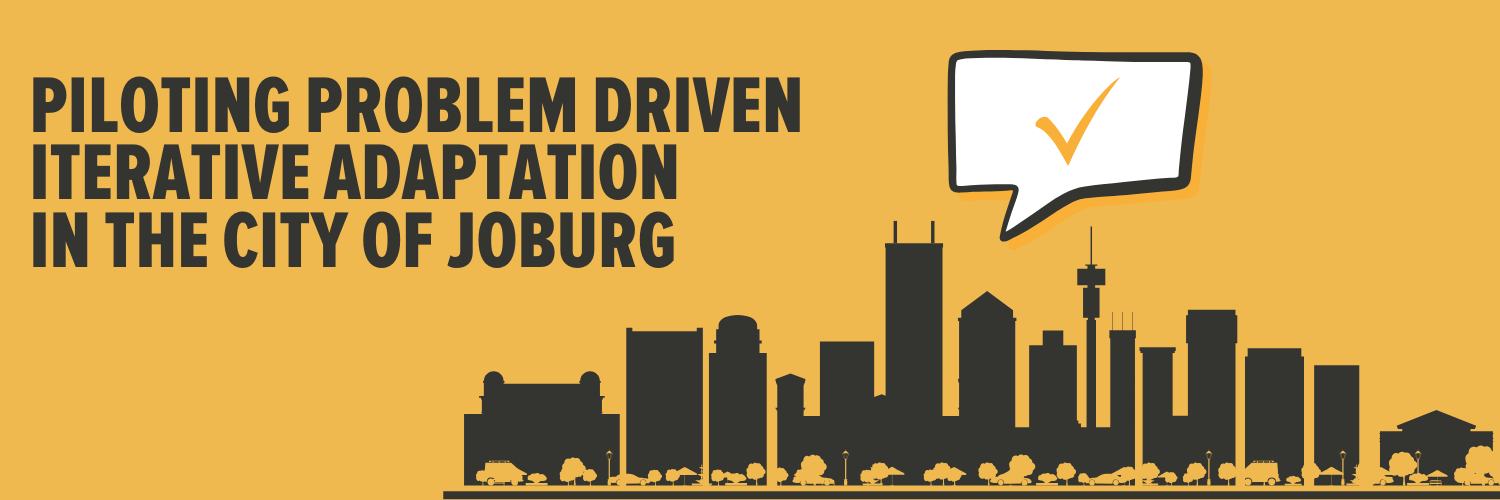
Addressing the gap between the state’s actual capability and its functions and developmental mandate was identified as a priority in the extensive stakeholder review that informed the SACN’s 2021 – 2031 strategic business plan.
The symptoms of this problem are seen in poor service delivery, which is the cities’ core mandate, and in the cities’ inability to meet the ambitious outcomes of developmental local government, namely inclusion, spatial transformation, and the mobilisation of all urban stakeholders.
Problem Driven Iterative Adaptation (PDIA) is an innovative approach to solving “wicked” or seemingly intractable public problems. It was developed in the Building State Capability Programme at Harvard University’s Kennedy School of Government.
PDIA is applied by small (eight to ten person) cross-departmental teams that first develop a comprehensive understanding of the problem they face and then develop and trial practical solutions adapted to the local context. This sequenced, multi-step process requires the teams to experiment, adapt their solutions iteratively, build consensus amongst stakeholders, and canvass for the support and authorisation of their colleagues in the administration.
PDIA has been used worldwide by public institutions tackling challenges across various sectors, from public finance to infrastructure to tourism, investment, public safety, and education. In South Africa, PDIA has been used in the National Treasury Government Technical Advisory Centre (GTAC), the Department of Small Business Development, and the Western Cape Provincial government but has not been applied in a city context.
The Programme Manager of Well-Governed Cities contacted Professor Matt Andrews at the Kennedy School of Government in September 2022. He was supportive of the idea of running a PDIA process in a South African city and recommended Peter Harrington, who co-created the PDIA methodology, as coach and facilitator.
In early 2023, the Programme Manager pitched the idea of a PDIA pilot in the City of Joburg to Liziwe Ntshinga-Makoro, Regional Director: E and Irene Mafune, Regional Director: F, in the Group Citizen Relationship and Urban Management (CRUM) unit.
Both were enthusiastic and signed up straight away. They appointed members of their staff to three PDIA teams (two in Region E and one in Region F) and suggested “problems that keep them up at night” (in Peter Harrington’s words) for the teams to focus on:
-
- Region E: Illegal dumping
- Region E: Illegal recycling
- Region F: Hijacked buildings
Harvey Phalatse, Director: Innovation & Knowledge Management, Group Strategy, Policy and Coordination Relations (GSPCR), also nominated staff from GSPCR, so the teams had both operational and strategic competencies.

The PDIA pilot kicked off in July 2023 with a joint teams meeting attended by the authorisers in CRUM and GSPCR, at which the team members all met each other, in some cases for the first time.
Over the next nine months, Peter Harrington met with the teams each week to facilitate their progress through the seven steps of the PDIA methodology, supported by one SACN staff member assigned to each team as a liaison. In a parallel process, Peter Harrington trained SACN staff in facilitating PDIA teams.
It immediately became apparent just how much time and hard work were required of the team members in addition to their regular jobs. They had to switch gears once a week to learn and apply their minds to the problems nominated by their authorisers.
The participants in the PDIA pilot learnt new ways to comprehensively understand and unpack problems into their causal elements and the importance of stakeholder engagement to corroborate this understanding. They learnt how to address the causes of the problem by getting the authority they needed to implement solutions, securing the buy-in of affected stakeholders, and accessing the resources within the team. Most importantly, the teams were empowered to start implementing solutions to the problems they had been charged with solving.
The pilot resulted in some important lessons for the city practitioners, including the benefits of working in transversal teams, the use of data in strategic communication to build support for implementation amongst senior city management, and increased awareness of the importance of citizen engagement: they learnt a method that increased their capability to begin solving seemingly intractable problems.
At the end of the pilot, two city practitioners, inspired by their PDIA learning journey, applied for and received scholarships to attend the Implementing Public Policy course at the Kennedy School of Government. One of them, Pinky Ferland, Stakeholder Manager at Pikitup, wrote about her PDIA experience in this blog post: click here
 Danga Mughogho is the Programmes Manager: Well-Governed Cities at the South African Cities Network (SACN); to contact him, email danga@sacities.net
Danga Mughogho is the Programmes Manager: Well-Governed Cities at the South African Cities Network (SACN); to contact him, email danga@sacities.net